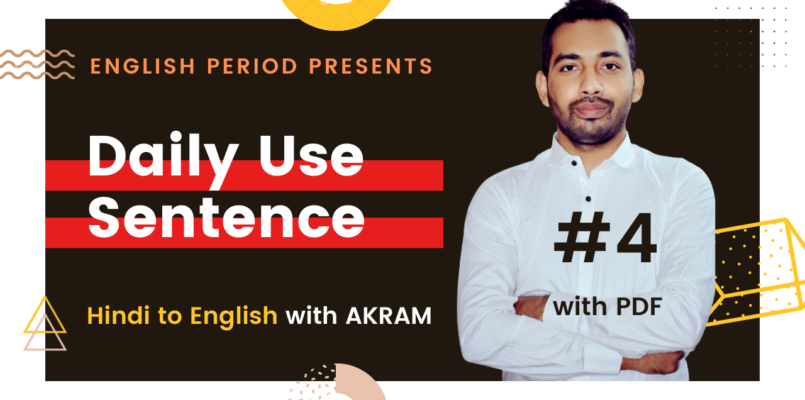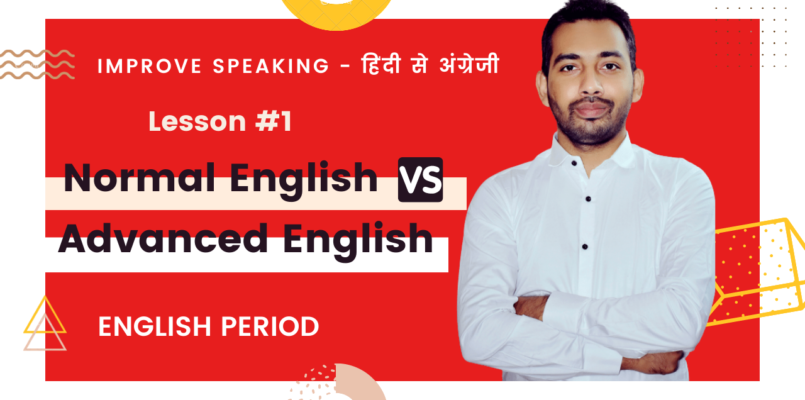Spoken English Hindi Lesson 3 me aaj hum baat karne ja rahen hain ki English me is tarah ke sentence ko kaise bolenge jiske aakhir me “फिर बाद में मत कहना” hota hai.


Spoken English Hindi Lesson 3 me aaj hum baat karne ja rahen hain ki English me is tarah ke sentence ko kaise bolenge jiske aakhir me “फिर बाद में मत कहना” hota hai.

Spoken English Hindi Lesson 2 me aaj hum baat karne ja rahen hain ki English me kisi se rasta puchne ke liye kya sentences use kar sakte hain.

Grammar is a guide good book that helps us form a correct pattern in reading, writing, and speaking. For that reason, we need it in daily use English. Besides, If you are an IELTS aspirant, Grammar for IELTS is crucial for you. Here in this lesson, we’re going to talk about “Present Perfect Simple.” Please keep in mind that you are not supposed to get a high band score unless you improve your grammar. So, learn and practice.

This is one of the important lessons in the Effective Vocabulary Series. first, try to answer the below questions before we start the lesson “How to Talk About Various Speech Habits.”
What adjective describe people who:
Know the answer? If not, keep reading to learn the terms about “How to How to Talk About Various Speech Habits.”

This is one of the important lessons in the Effective Vocabulary Series. first, try to answer the below questions before we start the lesson “Talk About Liars And Lying.”
What kind of liar are you if you:
Know the answer? If not, keep reading to learn the terms about “How to How to Talk About Liars and Lying.”

This is one of the important lessons in the Effective Vocabulary Series. first, try to answer the below questions before we start the lesson “How to Insult Your Enemies?”
What adjective aptly describe people who are:
Know the answer? If not, keep reading to learn the terms about “How to insult your enemies”

If you were looking for Useful Sentences to Improve Your English, then you are at the right place as you will get what you were up to, on this site. 10 Sentences in Hindi to English format, on daily basis, will be updated in the series by the Author of the website, Akram Khan. Now, let’s read the lesson “Daily Use Sentence Lesson 4.”

This is one of the important lessons in the Effective Vocabulary series. first, try to answer the below questions before we How to flatter your friends?
What adjective aptly describe people who are:
Know the answer? If not, keep reading to learn the terms about “How to flatter your friends.”

Spoken English Hindi Lesson 1 me aaj hum baat karne ja rahen hain ek Advanced Sentence Structure ke baare me. Us structure ka prayog karte huwe aap bahut se aise daily use sentences aasani se bana sakte hain jise log askar galat translate kar rahe hote hain. To aaiye shuru karte hai is video ke sath:

This is the first lesson in the Pronunciation Series Hindi to English. And, you are gonna learn how to overcome pronunciation and spelling mistakes in English. Do watch the following video before you start reading the notes of this lesson.

A vocabulary of power gives you the ability to condense a highly involved thought into a single word. Taking this thing into consideration, we are going to share with you some useful adjectives that will give you power in both speaking and writing.

This is one of the important lessons in the Effective Vocabulary series. first, try to answer the below questions before we Talk About Actions.
What verb means to:
Know the answer? If not, keep reading to learn the terms about “How to Talk About Actions”

If you were looking for Useful Sentences to Improve Your English, then you are at the right place as you will get what you were up to, on this site. 10 Sentences in Hindi to English format, on daily basis will be updated in the series by the Author of the website, Akram Khan. Now, let’s read the lesson “Daily Use Sentence Lesson 3.”

There are some useful sentences in Normal English vs Advanced English format. You can practice these sentences to Improve Your Communication in English. If you want to sound better in English, you should use the following advanced English sentences:

If you were looking for a Daily Use Sentence Hindi to English, then you are at the right place as you will get what you were up to on this site. 10 Sentences on daily basis will be updated in the series by the Author of the website, Akram Khan. Now, let’s see the sentences below:

If you were looking for a Daily Use Sentence Hindi to English, then you are at the right place as you will get what you were up to on this site. 10 Sentences on daily basis will be updated in the series by the Author of the website, Akram Khan. Now, let’s see the sentences below:

This is one of the important lessons in the Effective Vocabulary Series. The English language uses others languages’ phrases as well in speaking and writing. So, You should learn the following French Phrases in your English to sound more like a native speaker. Learn, practice, and improve skills in communication.

This is one of the important lessons in the Effective Vocabulary series. first, try to answer the below questions before we Talk About Various Science and scientists.
What scientists:
Know the answer? If not, keep reading to learn the terms about “How to Talk About Science and scientists”

Try to answer the below questions before we talk about “Talk About Various Practitioners.”
What practitioner:
Know the answer? If not, keep reading to learn the terms about “How to Talk About doctors.”

What is the title of the doctor who specializes in:
Know the answer? If not, keep reading to learn the terms about “How to Talk About doctors.”